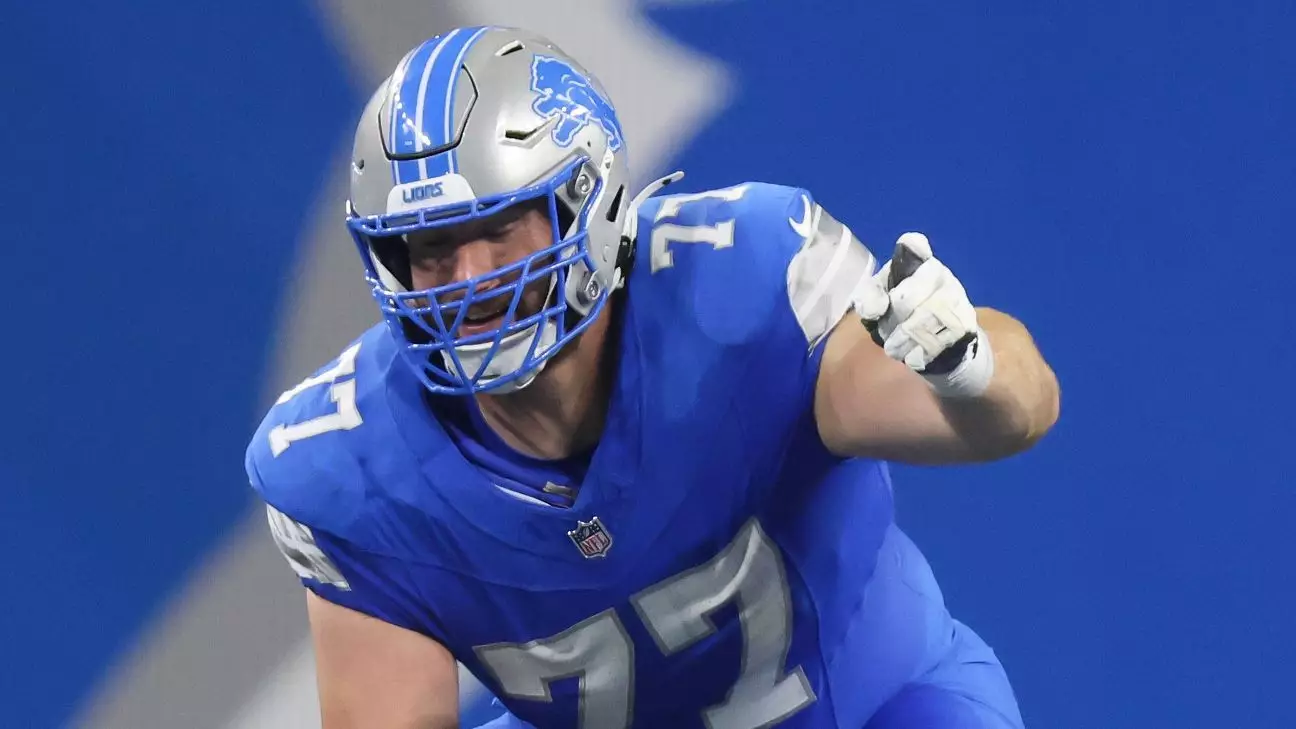In a heartfelt announcement on social media, Frank Ragnow, the Detroit Lions’ stalwart center and four-time Pro Bowl selection, shared the news of his retirement. His departure from the gridiron follows an agonizing period of self-reflection, one where he candidly evaluated his health, the wear and tear of his body, and the challenging realities faced by athletes at the peak of their careers. As Ragnow articulated, the decision to step away from football was not made lightly. It was a moment that necessitated deep introspection, highlighting the often-hidden struggles athletes face behind their celebrated public personas.
Ragnow’s choice underscores a critical dialogue about mental and physical health in sports—a conversation often overshadowed by sensational highlights and triumphant moments. In his farewell message, he expressed gratitude to the Lions organization and the fanbase, painting a touching portrait of a player who recognized the importance of legacy, well-being, and family over the allure of further athletic achievement. Each word reflected not only his appreciation but also an understanding that the game he loved could take a toll on both body and spirit.
Career Highlights Amid Challenges
Ragnow’s NFL journey has been nothing short of impressive, marked by substantial milestones and painful setbacks. He entered the league as the Lions’ first-round pick in 2018, quickly establishing himself as an essential component of the team’s offensive line. By 2021, after battling through a fractured throat—a harrowing injury few could endure—he was awarded a monumental four-year, $54 million contract, validating both his skill and resilience. This accolade, however, was not merely a testament to his talent; it symbolized Ragnow’s unyielding dedication to the Lions and his ability to rise above adversity.
But behind the accolades and achievements lies a story punctuated by injuries. Ragnow has fought through severe toe problems that have repeatedly sidelined him, including a significant stint in 2021 where he missed 13 games. His determination is inspiring, yet it raises questions about the sustainability of such physical sacrifices in pursuit of a sport that idolizes toughness. The former center has openly acknowledged that he may have to “navigate” with these injuries for the remainder of his life. This brings to light the pressing concern of the long-term impacts that professional athletes endure—often well beyond their playing days.
Shifting Gears: The Future of the Line
As Ragnow exits the stage, the Lions now face the daunting task of finding his successor on the offensive line. Rookie Tate Ratledge, another promising talent drafted from Georgia, has already begun taking first-team reps at center during organized team activities. Ratledge’s transition from guard to center underlines the Lions’ adaptive strategies in reshaping their offensive front as they prepare for the next season. The organization will undoubtedly feel the gap left by Ragnow, not only in skill but in leadership and experience.
The upheaval in the offensive line may spark concern among fans. Ragnow’s commendable track record in maintaining continuity as a starter will be sorely missed. Yet, it serves as a potent reminder of the cyclical nature of sports; players may retire, but the game evolves, offering opportunities for others to rise and carve out their own legacies. This transition phase has the potential to ignite innovation within the team and could lead to a reimagined dynamic up front.
A Personal Journey
The narrative of Frank Ragnow’s retirement is not merely a tale of an athlete stepping away; it is emblematic of a broader societal shift towards prioritizing health and well-being, even in the hyper-competitive environment of professional sports. As athletes grapple with the pressure to perform at elite levels, Ragnow’s choice echoes a crucial message: sometimes, stepping back is an act of bravery rather than defeat.
Framed through the lens of personal sacrifice, Ragnow’s legacy will likely inspire generations of players who choose their long-term health over the fleeting glory of a few additional games. In an age where sports culture often worships pain tolerance and fortitude, Ragnow’s decision to retire reflects a refreshing commitment to self-care and family, showcasing that the path of an athlete can—and should—include a focus on life beyond the field.

